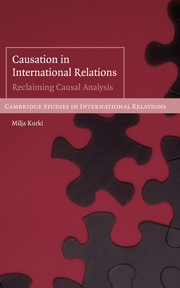Book contents
- Frontmatter
- Contents
- List of figures
- Acknowledgements
- Introduction: the problem of causation and the divided discipline of International Relations
- Part I The Humean philosophy of causation and its legacies
- Part II Rethinking the concept of cause
- Part III Reconfiguring causal analysis of world politics
- References
- Index
- CAMBRIDGE STUDIES IN INTERNATIONAL RELATIONS
Introduction: the problem of causation and the divided discipline of International Relations
Published online by Cambridge University Press: 22 September 2009
- Frontmatter
- Contents
- List of figures
- Acknowledgements
- Introduction: the problem of causation and the divided discipline of International Relations
- Part I The Humean philosophy of causation and its legacies
- Part II Rethinking the concept of cause
- Part III Reconfiguring causal analysis of world politics
- References
- Index
- CAMBRIDGE STUDIES IN INTERNATIONAL RELATIONS
Summary
The guiding aim of the discipline of International Relations (IR) at its inception in the aftermath of the First World War was the study of the causes of war. Scholars engaged in the new field of International Relations sought to uncover the causes of the Great War, and of wars in general, in the hope of thereby being able to avoid disastrous conflicts in the years to come. In the course of the twentieth century the causal questions that have been of interest to IR scholars have proliferated widely beyond those pertaining to the causes of interstate war: scholars in the discipline of IR have studied subjects ranging from the causes of democratic peace and the causes of globalisation, to the causes of global terrorism and the causes of global inequalities. Although studying causal relations has been fundamental to IR research from the start and continues to occupy scholars in the discipline, debates over causation have also been highly controversial.
During the past century it has become clear that theorists from different schools of thought have tended to disagree sharply over their substantive causal accounts of international politics. For example, the causes of war are still as contested as ever: just compare the variety of accounts given for the war in Iraq.
- Type
- Chapter
- Information
- Causation in International RelationsReclaiming Causal Analysis, pp. 1 - 20Publisher: Cambridge University PressPrint publication year: 2008

